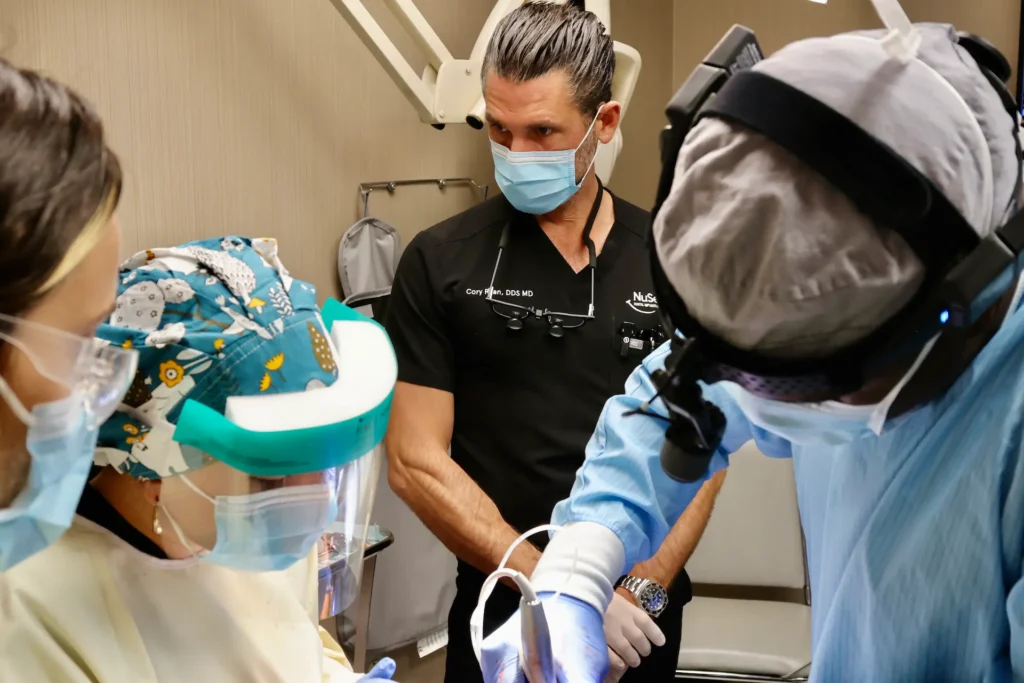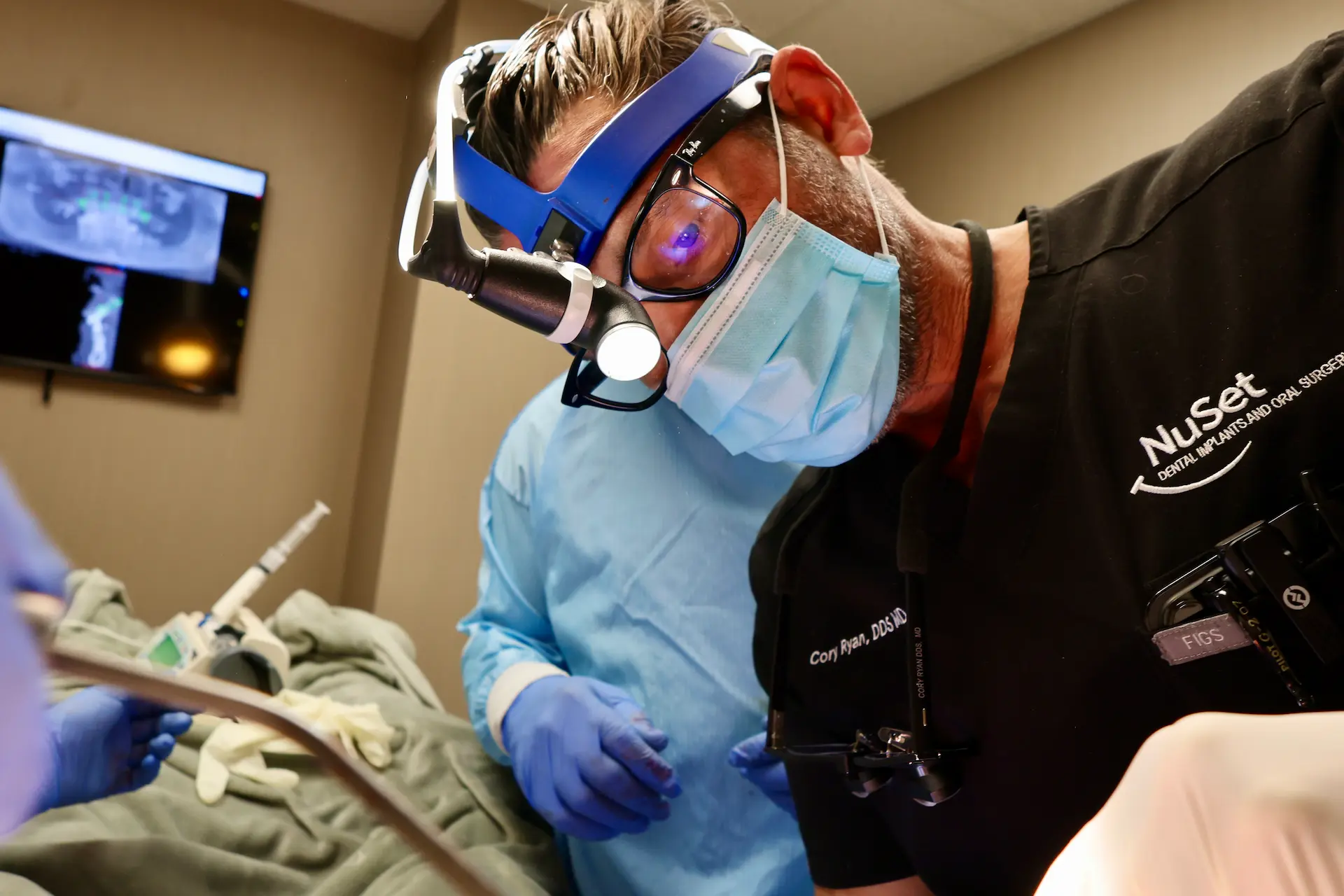Did you know that over 4 million people in the U.S. wear braces, and more than 3 million get dental implants every year? But what happens when you need both? If you already have an implant and want straighter teeth, you might be wondering: Can you still get braces?
The short answer is yes, but it takes careful planning. Braces work by gently shifting natural teeth, while implants stay fixed in place. This means your orthodontist needs a strategy that moves your teeth without disrupting your implant.
At NuSet Dental Implants and Oral Surgery, we specialize in helping patients get the best results, even in complex cases. If you’re considering braces with an implant, this guide will clear up confusion, set realistic expectations, and help you make the right choice for your smile.
Key Takeaways
- You can get braces if you have a dental implant, but the treatment needs careful planning.
- Braces move natural teeth, but implants stay in place.
- It’s best to get braces first before an implant to ensure proper alignment.
- If you already have an implant, your orthodontist will adjust your treatment to move the surrounding teeth.
- Clear aligners, sectional braces, or retainers may be good alternatives if full braces aren’t the best fit.
- If an implant was placed before braces, it might need adjustments after treatment.
- A specialist team at NuSet Dental Implants and Oral Surgery collaborates with orthodontists to develop a smooth, customized treatment plan that ensures the best results without complications.
How Do Braces and Dental Implants Work?

Braces and dental implants both improve your smile, but they work in very different ways.
Braces use gentle pressure to move teeth over time. They rely on brackets, wires, or clear aligners to shift teeth into the right position. The process is slow but effective, making sure each tooth moves safely and correctly.
Dental implants, on the other hand, don’t move at all. They are made of titanium or zirconia and placed directly into your jawbone, where they fuse with the bone. This makes them strong, stable, and permanent—just like natural tooth roots.
This is why orthodontists plan carefully when braces and implants need to work together. If an implant is already in place, the teeth around it can still move—but the implant itself won’t budge.
Can You Get Braces If You Have a Dental Implant?
Yes, you can get braces if you have a dental implant. But the approach depends on your unique situation.
Here are two common situations:
Getting Braces Before a Dental Implant (Ideal Scenario)
If you know you’ll need a dental implant in the future, braces should come first. This way, your orthodontist can move your teeth into the perfect position before placing the implant. Once your teeth are aligned, your specialist will insert the implant in the exact right spot.
This is the easiest approach because it avoids complications. You won’t have to work around a fixed implant, and your results will look more natural and balanced.
Getting Braces After a Dental Implant (Still Possible!)
When you come to us at NuSet Dental Implants and Oral Surgery, we work to create a treatment plan that keeps your implant safe while achieving the smile you want.
How to Find the Right Implant Specialist
Choosing the right specialist is the most important step when getting braces with a dental implant. You need a team that understands both orthodontics and implant dentistry so your treatment is safe and effective.
You need a trusted implant specialist. If your implant was placed before orthodontic treatment, it’s important to check if it’s in the right position. In some cases, a new crown or a minor adjustment might be needed after braces. A knowledgeable implant specialist will make sure your implant stays functional and looks natural.
When searching for a provider, ask questions. Find out what experience they have with braces and dental implants together. Look at patient reviews and before-and-after photos. A great specialist will walk you through the process and make sure you feel confident in your treatment.
Get the Best Smile with the Right Experts!
Braces and dental implants can work together, but it takes expertise to get the best results. Since implants stay in place, your orthodontic treatment needs to be carefully planned to avoid complications and ensure the best results.
At NuSet Dental Implants and Oral Surgery, we specialize in creating custom treatment plans for patients who need both implants and orthodontic care. Whether you need braces first to align your teeth before an implant or adjustments around an existing implant, we make sure everything works together for a seamless outcome.
Schedule a consultation today and take the first step toward a healthier, more confident smile.
Frequently Asked Questions
Can I get my teeth straightened with an implant?
Yes! Even if you have a dental implant, you can still straighten your teeth. Since implants don’t move like natural teeth, your specialist will adjust your treatment to shift only the surrounding teeth. In some cases, clear aligners or sectional braces may be a better option than full braces.
Should I get an implant or braces first?
Braces should almost always come first. This ensures your teeth are properly aligned before the implant is placed. Since implants don’t move, placing one too early can affect your final results. If you already have an implant, your orthodontist will plan around it to make sure your smile is balanced.





